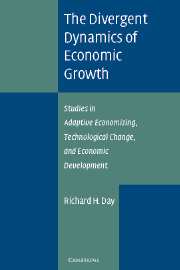 The Divergent Dynamics of Economic Growth
The Divergent Dynamics of Economic Growth Book contents
- Frontmatter
- Contents
- Preface
- Acknowledgments and Comments
- 1 The Adaptive, Evolutionary Theory of Divergent Economic Growth
- PART ONE GLOBAL TRENDS AND ADAPTIVE ECONOMICS
- PART TWO TECHNOLOGICAL CHANGE IN AGRICULTURE AND INDUSTRY
- 4 The Economics of Technological Change and the Demise of the Sharecropper
- 5 Economic Development as an Adaptive Process
- 6 Industrial Development and Technological Change
- 7 An Adaptive Economizing Analysis of Chinese Enterprises Under Alternative Reform Regimes
- PART THREE EPOCHAL DEVELOPMENT
- PART FOUR TOWARD A GENERAL THEORY OF DEVELOPMENT
- Index
7 - An Adaptive Economizing Analysis of Chinese Enterprises Under Alternative Reform Regimes
Published online by Cambridge University Press: 08 August 2009
- Frontmatter
- Contents
- Preface
- Acknowledgments and Comments
- 1 The Adaptive, Evolutionary Theory of Divergent Economic Growth
- PART ONE GLOBAL TRENDS AND ADAPTIVE ECONOMICS
- PART TWO TECHNOLOGICAL CHANGE IN AGRICULTURE AND INDUSTRY
- 4 The Economics of Technological Change and the Demise of the Sharecropper
- 5 Economic Development as an Adaptive Process
- 6 Industrial Development and Technological Change
- 7 An Adaptive Economizing Analysis of Chinese Enterprises Under Alternative Reform Regimes
- PART THREE EPOCHAL DEVELOPMENT
- PART FOUR TOWARD A GENERAL THEORY OF DEVELOPMENT
- Index
Summary
Introduction
This chapter develops a dynamic analysis of the industrial firm that can be used to simulate enterprise behavior over time under alternative policy environments. The objective is to provide a tool for evaluating and projecting the response of key variables, such as output, employment, productivity, and profitability, to specific instrumental changes in economies that are undergoing major transitions in technology and to changes in the relationship between government and individual enterprises. In particular, we use it to consider China's economy during a period of evolving reforms that began in 1980. The Chinese example is, of course, of tremendous contemporary importance given the sheer size of the country, the dramatic progress that has occurred, and its unique process of introducing market mechanisms gradually within a Communist political system. Our model will be useful for understanding some aspects of this process and, we hope, for understanding similar processes in many different settings.
Aside from differences in the level of technology, the underlying engineering conditions of production and capital accumulation are more or less common to any economic system. The managerial conditions, however, depend on the political environment and the precise manner in which the government's plans and policies impinge on the constraints, costs, and benefits associated with enterprise opportunities. As policies change, these several components of the managerial problem also change.
- Type
- Chapter
- Information
- The Divergent Dynamics of Economic GrowthStudies in Adaptive Economizing, Technological Change, and Economic Development, pp. 115 - 138Publisher: Cambridge University PressPrint publication year: 2003


